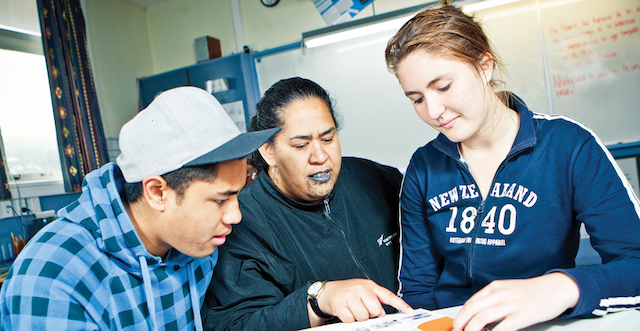Expectations must have a sound basis
Learning involves making connections between prior knowledge and new information. Graham Nuthall (2007), building on Adrienne Alton-Lee’s (1984) doctoral research, studied students’ perspectives on the classroom, uncovering the remarkable differences in the knowledge, interests, experiences, and motivating influences that individual students bring to their learning. To plan learning experiences that will give all students opportunities to make connections to new concepts, teachers need to understand what each student brings to their learning. This involves gathering and analysing a wide range of data – not just about achievement but also information derived from observations of learners and conversations with them and with their peers, families, and whānau.
When working with such data, teachers and school leaders need to examine their own assumptions – especially to tease out assumptions they are not aware of holding – for any that may lead to inappropriately high or low expectations for particular learners. This is especially important when establishing expectations for students who have special education needs, who are English language learners, or whose cultural background differs significantly from that of their teachers.
As human development is seldom straightforward and linear, it is also important to closely track individual student progress, reviewing and revising expectations in collaboration with learners and their families.
BES Exemplar 1: Developing communities of mathematical inquiry
BES Exemplar 1 focuses on two teachers at a small, multicultural primary school who took part in professional learning on developing their classroom learning communities.
As a result of this collaborative inquiry, their students greatly accelerated their progress while growing in their identity as mathematicians. The exemplar shows how the teachers changed their expectations as they observed their students’ improved mathematical proficiency. One teacher later reflected:
I thought I had high expectations ... I have realised I [had] low expectations.
The students themselves also developed high expectations for their own outcomes.
You can find this BES exemplar online.
Tawa College: High expectations for diverse students
Tawa College’s statement of purpose declares its aim to “develop students’ intellectual abilities, personal maturity, and social responsibility in an educational environment which promotes achievement, resilience, self-esteem, and service”. The school’s programmes promote high achievement in a broad range of domains. For example, the formal mentoring programme, in which year 13 learners support those in years 9 and 10, has both social and academic benefits for everyone involved.
The school’s increasingly diverse student population has prompted an ongoing focus, led by the senior leadership team, on catering for diverse needs. Ways of addressing these needs have included targeted goal setting for individual students, differentiated planning, and smaller classes for junior students identified as having the greatest literacy and numeracy needs.
The learning support staff explicitly focus on realising the potential of students with specific needs for progress and achievement, and ensure that it is realised through initiatives such as professional support for teacher aides, a parent support network, and close tracking and monitoring of English language learners. A focus on Māori and Pasifika students has included improved tracking of their achievement and whole-school professional development for teachers.
The school has much to celebrate. Its NCEA results are consistently higher than the national average. Thanks to strong parent support, over 60 percent of students participate in its sports programme, a significant number of them at national level. Its arts programme – especially music – is renowned in the Wellington region. When students meet expectations and exceed them, their success is shared: on the school website, in newsletters and assemblies, on honours boards, in the prospectus, and in the local papers.
In an interview posted on the local community website Tawa Link, 2011 head girl Elyjana Roach was asked why she liked Tawa College. Her response shows that much of the school’s success stems from its expectation that all will reach their potential – and from the support it gives them to get there:
I like the level of expectation from teachers and just the general atmosphere to do well.

